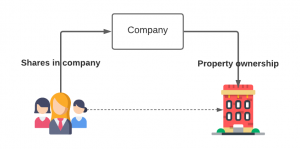Now that the decision in Cooper v The Owners – Strata Plan No 58068 [2020] NSWCA 250 (Cooper) has been handed down, you may be wondering if the recent NSW Court of Appeal decision also applies to company title buildings. If you missed our article on Cooper and what it means for pet bans and by-laws in strata schemes, you can read all about this here.
Does the decision in Cooper apply to company title buildings?
This is a complicated question but can be tackled by going back to ‘company title basics’ including understanding exactly what ‘owning’ a unit in company title involves.
Below, we get down to the nitty-gritty of what the company title scheme of ownership entails and the rights that ‘owners’ hold in company title.
What is company title?
You hold ‘shares’, you don’t hold a ‘property unit’
First, an ‘owner’ of a home unit in a company title does not hold any property rights over the land, the building or unit. Instead, as a shareholder, you are the owner of a share group which provides you with a contractual right to exclusively use and occupy a particular section of the building (being a unit).

This means that your occupation of a home unit is not a property right. This can be contrasted with a strata title building in which the owners do have a direct property right in the building. This fact, i.e. that a strata title owner has property rights was key to the decision in Cooper.

As an owner in a company title building you hold a contractual right to occupy a home unit. This is highlighted by the fact that you do not hold a Certificate of Title issued by the Land Registry Services. Instead, you hold a Share Certificate issued by the company which is evidence of your ownership of a ‘share group’ in the company.
Conditional on the Articles of Association/Constitution
Further, your right to occupy a home unit is subject to the Articles of Association (the Constitution) which is a statutory contract between you and the company.
The Constitution of a company title building generally provides that your right to use and occupy a home unit is conditional on you complying with the regulations/rules made by the company (usually through its Board of Directors). Regulations may include rules relating to the keeping of pets within a home unit.
Strata legislation is not applicable
Cooper explored the applicability of the Strata Schemes Management Act 2015 (NSW) to the making of by-laws in a strata scheme. The strata legislation is not applicable to company title buildings. Instead, it is the Corporations Act 2001 (Cth) that governs company title as well as a company’s Constitution. Neither of these two sources of law were explored in Cooper.
Why are property rights so important?
The decision in Cooper was premised on the Coopers being owners in a freehold estate (being their apartment lot) which attaches a bundle of property rights which are anticipated by the Strata Schemes Management Act 2015.
This essential fact is missing from company title buildings, where the company is the only holder of property rights. This means that company title buildings are not bound by the decision in Cooper.
Is Cooper still relevant to company title buildings?
Yes, the decision is still relevant to company title buildings because it explores sensitive issues that are common to all communal living arrangements and high-density apartment complexes. It is important that all stakeholders in company title are aware of the issues that make people tick in communal living. Without a doubt, pet ownership is one of these live issues.
Cooper is also relevant because House Rules (the equivalent of by-laws in strata) can be passed by the Company. However, House Rules cannot constrain a right that shareholders hold under the Constitution. Like the decision in Cooper, a company must ensure that any rule or regulation made by the company does not adversely impact a shareholder’s contractual right under the constitution (as opposed to a lot owner’s property rights in strata which was the key question in Cooper).
To put this in simple terms, the reasoning in Cooper could be used to support the argument that a House Rule that prevents pet ownership may be adversely impacting a shareholder’s contractual right to occupancy of the unit. Our view is that in most company title buildings this argument is weak, and the Board’s ability to pass House Rules preventing pet ownership remains strong.
Get in touch
We understand that the constant changes in land law can be confusing and overwhelming. This confusion is further heightened in company title, where the very unique scheme of ownership is not always well understood.
We can help you navigate this unique area of law including reviewing your House Rules to ensure that they are compliant. Get in touch with us to obtain further information on this topic on 02 9199 8597 or email wehelp@jfmandreyev.com.au
The information contained in this post is current at the date of editing – 1 December 2023.


